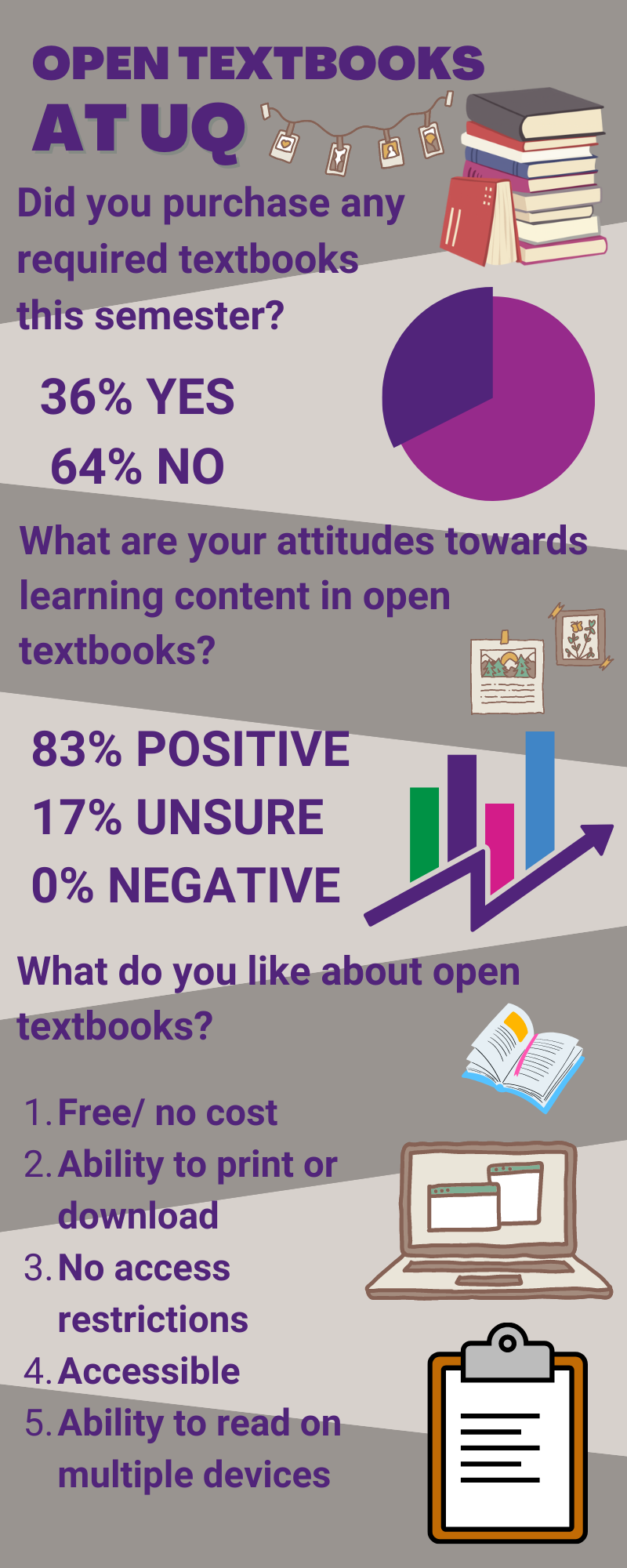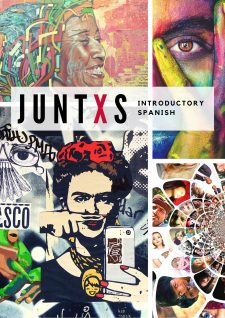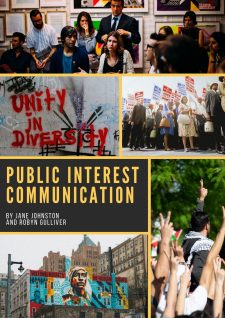Students today are questioning the triple-digit price tags of commercial textbooks in favour of a cheaper alternative – online open textbooks, accessible anywhere, on any device and most importantly, at no cost. But are they as good as they seem?
The Library partnered with UQ students Lara Drysdale, Danny Theodorou and Prachi Rehan to investigate UQ student experiences with textbooks and what impact open textbooks could have at UQ.
In a survey distributed to the UQ community during September 2022, Lara, Danny and Prachi identified several issues students currently have with commercial textbooks. They argue that open textbooks are the key to solving them.
Many students do not purchase textbooks
 Over half (64%) of surveyed students did not purchase textbooks during Semester 2, 2022. Of the 36% who bought a textbook, half questioned whether it provided good value for money.
Over half (64%) of surveyed students did not purchase textbooks during Semester 2, 2022. Of the 36% who bought a textbook, half questioned whether it provided good value for money.
Student responses about purchasing required textbooks:
The textbook is helpful, however, it was extremely expensive and only covered part of the course.
95% of the time "required" textbooks for a course are not at all required or even referred to during the course, some of these are not free or online which can be misleading and disappointing for students who pay the fee yet never need to use the book.
I had to dip into savings for something I won’t use after this course.
Online textbooks
Online textbooks, particularly ones offered through the Library, are not always as convenient as they might seem. Vendors can control access how many students can access an online book at one time and whether it can be printed or downloaded. As well as ignoring students’ reading preferences, these restrictions can cause issues for students during busy times of the semester or during assessment time.
Student responses about online textbooks:
No restrictions on the textbooks made it simple to download chapters with ease, without worrying about the 20-page limit like in restricted textbooks. I personally need to highlight and annotate, so I need to download and print these, to maximise my understanding.
The only issue with online textbooks is the fact that they are limited in copies that can be used at one time. When exams are coming up, they are usually all in use and it’s hard to revisit the textbook.
When asked to rank what was most important to them, the ability to print or download and lack of access restrictions were identified in the top five most important things, along with being free or have no cost, accessible and have the ability to read on multiple devices.
Open textbooks
46% of students surveyed already frequently use open textbooks in their studies, and the overwhelming majority of surveyed students (83%) expressed positive feelings about open textbooks.
Sometimes this expression was clearly linked to past experiences in using a particular open textbook:
I liked my experience using the Social Cost Benefit Analysis book by Dr Suzanne Bonner. I wish more instructors would follow her lead.
When asked to rank possible factors as to what they liked about open textbooks, students ranked free or no-cost learning resources as being the most important. This was confirmed by some of the free-text student responses:
Education (nor academic success) should not be hidden behind paywalls …
Because I don’t have to stress about purchasing and it is more accessible and easier to use and learn through multiple devices. It is way more engaging and makes learning easy!
Given some of the access issues that can occur with online textbooks offered through the Library or when individually purchased, students ranked freedom from access restrictions as their second most important factor.
I like the free and easy access, and the ability to print and notate on.
I’ve been able to download and use the textbook at my leisure, and it’s been really informative.
Interestingly, although students ranked the inclusion of interactive content and activities lower than other factors, some students emphasised interactivity as being valuable in their free-text responses:
Downloadable exercises as well as interactive MCQ [multiple choice questions] makes learning more intuitive and fun.
The interactive textbooks are the most helpful to aid learning.
Academic involvement
This project opened Lara, Danny, and Prachi's eyes to the impact that academics can have on students' access to learning resources.
Even though some academics hold concerns about the quality of open textbooks and the time needed to implement them in their courses (Ozdemir & Hendricks, 2017), many academics recognise that open textbooks are a step toward equitable and free textbook access for all students (Jhangiani & Jhangiani, 2017).
Lambert and Fadel (2022) observe that a move towards open textbooks in Australia can help financially support university students in their studies.
Survey responses indicate that UQ students who had used open textbooks really valued the fact that a free textbook was supplied by their lecturer.
As educational institutions worldwide increasingly adopt open educational resources, Lara, Danny and Prachi challenge UQ lecturers to consider using open textbooks in their courses and to lead the UQ community into the future of open-access academia.
Visit Open Textbooks @ UQ for more information about open textbooks and check out our catalogue.
References
Jhangiani, R. & Jhangiani, S. (2017). Investigating the perceptions, use, and impact of open textbooks: A survey of post-secondary students in British Columbia. International Review of Research in Open and Distributed Learning. 18(4), 172-192. https://files.eric.ed.gov/fulltext/EJ1146242.pdf
Lambert, S. & Fadel, H. (2022). Open textbooks and social justice: A national scoping study. https://www.ncsehe.edu.au/wp-content/uploads/2022/02/Lambert_OpenTextbooks_FINAL_2022.pdf
Ozdemir, O., & Hendricks, C. (2017). Instructor and student experiences with open textbooks from the California Open Online Library for Education (Cool4Ed). Journal of Computing in Higher Education. 29(1), 98–113. https://doi.org/10.1007/s12528-017-9138-0


